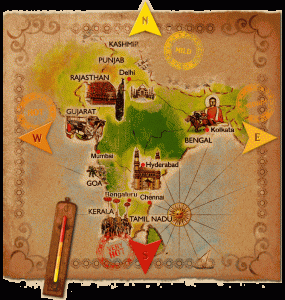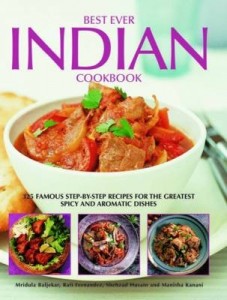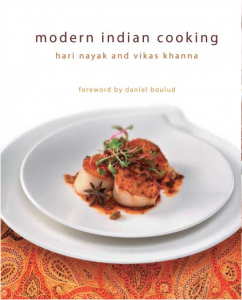Arjun Appadurai. “How to Make a National Cuisine: Cookbooks in Contemporary India.” Comparative Studies in Society and History. Cambridge University Press ( Jan, 1988 ), 3-24
 In “How to Make a National Cuisine: Cookbooks in Contemporary India,” Appadurai argues that by comparing India’s old cookbooks with the more recent ones, it is possible to examine a branch of this culture, in order to understand that national cuisine is emerging from different regional cuisines. The author supports this claim by giving a brief explanation of the purpose of a cookbook (beyond recipes), and how each one reflects on: Cultural context, traditions, culinary processes and the structure of domestic ideologies. His purpose is to make a connection between India’s culture and the National identity. This article was published in “Comparative Studies in Society and History”, and Appadurai is addressing an audience interested in the change of human societies through time and in the contemporary world.
In “How to Make a National Cuisine: Cookbooks in Contemporary India,” Appadurai argues that by comparing India’s old cookbooks with the more recent ones, it is possible to examine a branch of this culture, in order to understand that national cuisine is emerging from different regional cuisines. The author supports this claim by giving a brief explanation of the purpose of a cookbook (beyond recipes), and how each one reflects on: Cultural context, traditions, culinary processes and the structure of domestic ideologies. His purpose is to make a connection between India’s culture and the National identity. This article was published in “Comparative Studies in Society and History”, and Appadurai is addressing an audience interested in the change of human societies through time and in the contemporary world.
India is a country that values their customs and traditions, and this is reflected in the cookbooks they have published through time. Appadurai points out the fact that these cookbooks, once published in the different regional dialects, are now published in English, trying to reach a wider audience than the one that was previously covered; however, these cookbooks also create issues concerning a language barrier that still exist among the different social classes in India.
Apparduari’s study of Indian cookbooks researches the following issues: women and
domesticity; language and literacy; and cities and ethnicity, (4). Indian cookbooks are organized in such a way to reflect different customs of cooking and dining. Some cookbooks are organized by a particular kind of food, others by spice combinations, because sometimes Indian dishes involve a large variety of spices.
These cookbooks share cultural tales, such as Hindu festivals and customs, guides for dining etiquette, the diversity in culinary process, budgeting grocery expenses, and the structure of domestic ideologies (3).
In this article, Appadurai addresses the relation between cookbooks and society. With the colonial European influences, cooking methods and new dishes were introduced to the Indian culture.
These European influences created conflicts within India’s strict regional traditions. India has just recently developed the concept of national cuisine, whereas in the past it was separated into regional cuisine, and the national cuisine does not seek to hide its regional or ethnic roots. The author also mentions the importance of the social changes that have taken place in India during the last century,
first becoming an Independent nation and following the expansion of different cities in major metropolitan areas. As of today in India there are increasing amounts of urban cultures and groups, and the ever growing population has now access to the widest variety of different regional cuisines and stories than ever before.
India is famously known from its caste hierarchy, which is against their current laws, but it has deep roots in the Indian culture and is still practiced today among Hindu religion. The caste system has influenced, not only the formation of the modern day Indian cuisine, but also impacts the concept of Ethnic Other. Ethnic Other refers to a group that by certain feature is defined as being different; “other than you.” Due the huge influence of the caste system in the history of India, it also reaches out to the development of Indian cuisine. Appadurai addresses that crossing ethnic boundaries or dining across ones caste is still seen as a “delicate matter” (7), although the attitudes toward caste system seem to be more liberal than ever.
Now that people are more mobile, we are learning about cuisine from other cultures and stories related to food that come from “others.” One of the examples of specific cuisine is sweet food and how Indian people have developed a special relation with it. By this type of special relationship with certain food items or a cuisine, other people are able to find a lot about the Ethnic Other. Based on the relationship with food and other preferences you are also able to explore, for instance, what values other ethnic groups hold.
The printing press has dramatically affected the sharing and producing process of cookbooks in India. Within the last two decades, there has been a significant increase in the number of printed Indian food cookbooks written in English. These cookbooks are made available in literate civilizations and read by middle class women. Because of this, cooking in India is viewed as a specialized skill.
Cookbooks have changed the traditional way of being restricted to only orally sharing recipes in designated social castes, by establishing a modern way of sharing. Since India is broken up into regional castes and social ranks, cookbooks are a way for women to experience the tastes from different castes and regions. The media reaches urban housewives through recipes printed in newspapers and magazines, making it easy to learn about the cooking styles and traditions from surrounding regions and from other countries around the world.
To conclude, it is important to take a look of the cultural evolution that India has had throughout its history, and how cookbooks witnessed all of these changes. Starting from different styles of cooking in every region, to a centralized style imposed during colonial times, and finally the emergence of a national cooking style. All of these changes can be traced, if the old cookbooks are compared to newest ones and analyze the recipes, authors and audience for every cookbook. Finally it is important to note the difference that still exists among the different audiences for every cookbook, still marked by the stigma of the social classes and the caste system. Cookbooks are now intended for an urban society, in which anyone can cook an immense variety of dishes from the different regions of this wonderful country.




